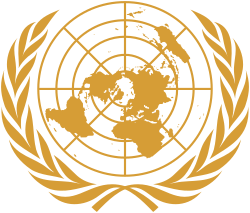| Eightieth session of the United Nations General Assembly | |
|---|---|
9 September 2025 – 8 September 2026 | |
 | |
 | |
| Host country | |
| City | New York City, United States |
| Venue | General Assembly Hall at the United Nations Headquarters |
| Participants | United Nations Member States |
| President | |
| Secretary-General | António Guterres |
| Website | www |
| This article is part of a series about the |
| United Nations |
|---|
 |
| Charter |
| UN System |
| Funds, programmes, and other bodies |
| Specialized agencies |
| Membership |
| History |
| Resolutions |
The Eightieth session of the United Nations General Assembly is the current session of the United Nations General Assembly, which began on 9 September 2025. [1] The president of the General Assembly is from the Western European and Others Group. [a]